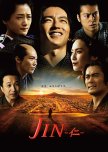Upon finishing the first episode of this drama I would not have been able to predict that I would be reviewing it with such a critical eye; once those end credits rolled I proclaimed, 'Wow, this one just might be the one'. I had that feeling, that I was at the beginning of something magical, starting 'a favourite'.
Now, my experience with dramas that I've rated really highly overall usually follows the pattern of being drawn in, context being established over a few average episodes and then by the fifth or sixth finding myself completely engrossed in the drama... usually ending on an emotional high, my face full of tears and the memory of what I've just watched poignantly lingering in my mind for days, sometimes weeks, after. That is the magic, where the emotional plight of the people of countries thousands of miles away from our own native land touch our hearts, unite us. Seeing the enthusiastic fanbase for Jin, I imagined myself feeling the same things, becoming engrossed in this drama's elaborate plot.
I decided I could suspend my disbelief, willingly accept the timeslip and travel back to Edo, and on that commitment I paid in full. The setting was never the issue; the viewer always mindful of the strong effort put into embellishing this premodern Japan with all the convincing articles, and the hospital setting within Tokyo felt authentic too.
No, my criticism of this drama lies predominantly in the emotional content, the acting, the melodrama.
Initially I felt overcome, not just by Minakata Jin's painful past, by his sudden departure to historic Edo, but more so by how the drama encouraged you to empathetically connect with the minds of the people who don't understand his methods, struggle to see the good in what appear to be wicked, vulgar and wholly unexplainable actions. For the first couple of episodes this was the most captivating aspect of the drama, but this was very quickly and negatively upstaged by excesses of emotion and enthusiasm. A once rallying "Hai!" rapidly became tedious, regardless of the circumstances. Rather than bringing me closer to the drama, the continuous tears, flashbacks and bowing, with such vehemence that I found myself wincing each time a head hit the floor, created an emotional disconnect.
Furthermore, I felt that the plot didn't actually go anywhere and found myself finishing episodes with no real idea of what the important issues of the coming episode would be. What's worse is I found myself willingly leaving my computer to do other things between the 15 minute parts when streaming the program.
So, to explain my ratings. The story I rated highly for it's cultural and historical content, the insight into premodern Japanese medicine, rituals and social behaviours; I'd also like to comment that despite the usual dodgy baldcaps, the costumes, make-up, special fx and settings were delightful and of a good standard for a television drama. The music was also pleasing, I liked the choice of song for the ending credits and the way it played over the last scenes of each episode and the OST was fitting.
The acting I rated as average since some performances were good, others excruciating, verging on embarrassing although I can't imagine trying to deliver such intensity of emotion allowed for nuance.
I wouldn't feel inclined to watch the drama again, and felt comfortable giving it a 6 overall as while I wouldn't say this drama was more than mediocre, it does at least merit watching for the historical setting if that's of interest to you.
Just my two pennies worth - many people feel differently, as reflected in other reviews and in the ratings overall =)
Considerați utilă această recenzie?








